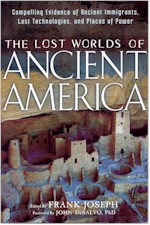 |
|
|
| ||||||
|
|
This page is the original source of this review, though you may also find it on Amazon or other sites. | ||
| Book Reviews Home | Free Audio Books | |
 |
Book Review of: The Lost Worlds Of Ancient AmericaCompelling Evidence of Ancient Immigrants, Lost Technologies, and Places of Power Price: $9.73 Availability: Usually ships within 24 hours |
| Review of
The Lost Worlds Of Ancient America
, Edited by Frank Joseph (Softcover, 2012) (You can print this review in landscape mode, if you want a hardcopy) Reviewer: Mark Lamendola, author of over 6,000 articles. This book was a pleasure to read. I found it similar to an earlier work that Frank Joseph edited. Like that work, it was a collection of short essays or articles. In this work, the tone is less aggressive and more scholarly, which helps with both credibility and readability. People in Mr. Joseph's professional circles are very interested in the feud between themselves and mainstream archeologists. Readers, much less so. Our interest is in the subject itself, and this work reflects that better than the previous one. As with the previous one, some of the arguments are facetious. This problem is one reason why those taking these alternate views of archaeological dogma are often so quickly dismissed as "not serious." I think that's a pretty thin reason, because poor arguments do not make unexplained evidence go away; they just leave it unexplained. It would be better to say, "This person has a point, and although it's not a well-made point it is a good place from which to rethink this topic." That's how I have approached these works. It isn't true that you must accept Theory B for Theory A to be false. If Theory B is false, that doesn't make Theory A true. Both are possibilities. But if Evidence X puts Theory A on shaky ground (no pun intended) or even makes it untenable, then a new theory is needed. One pleasure of this book is the discovery of things you just don't read about elsewhere unless you subscribe to very narrowly focused magazines and other media (and I do not mean narrowly focused in a negative sense). Another pleasure is exploring along with the contributors their take on what these things might be. Where the logic fails, the reader must switch from that exploration to merely musing on some possibilities.
Mr. Joseph's editorial hand is perhaps too light, as there's not a cohesive, singular vantage point for this book. An issue that illustrates that is the recurring Atlantis theme. Between this book and several others, I must have read a couple dozen treatises whose authors each claim to know the truth. Where such counterclaims on a subject exist, it's usually the case that the underlying premise is false. That may not be the case with Atlantis, but I think including it along with less speculative items is a bad idea. A separate compendium of Atlantis-related essays and articles would probably be good, as opposed to tossing them in with the more evidence-based essays and articles. Maybe a cohesive, singular vantage point isn't best. Maybe presenting conflicting information for the reader to think about is best. But if this was Mr. Joseph's thinking, then he should have focused the book on fewer topics and presented the viewpoints on those topics more fully. For example, most of the contributors complain about establishment archeologists but none of them have an article or essay in this book. The grammatical gaffes are further evidence of light-handed editing. While I appreciate Mr. Joseph's technical expertise, he does need some help with the other aspects of editing. For example, he misuses "compliment" in place of "complement." Now that I've addressed the editing, let's look at something else. In our modern era of gangsta government, we have become used to disinformation, suppression of fact, and the intellectually insulting "reporting" done by the state-run mudstream media. Even our history books support fraud; the United States never had a civil war. It had a war of secession. That distinction makes all the difference in the world. How much of our archeological history is similarly constructed to perpetuate fraud? As you read these essays, you might not get the absolute truth (in many cases, it simply is not knowable), but you will get a viewpoint that differs from what you've been taught and it will usually be supported by significant evidence. And in most cases, that'll be significant evidence combined with intelligent questions and fairly solid arguments. Personally, I find the results of exposure to that sort of thing to be hugely advantageous. The alternative is to be a zombie who accepts the official stories, and the fact so many people routinely choose that alternative explains a lot about why things are the way they are. So to me this book has some practical advantage, if only for the intellectual exercise. Beyond that, it's an entertaining read and some of the details are startling. I don't think it's necessary to have "the answer." A few of the essayists think they do, and they make no better case than the orthodoxy they challenge. Some of the essayists, however, simply ask the reader to consider some very interesting anomalies. And for people who like engaging conversations, picture having dinner with a smart friend of yours when you ask, "So what did you think of that information I sent you about Rock Lake Rock?" The response could lead to discussion of any of the 45 chapters of this book. How the heck did those Andeans, who had no beasts of burden, haul building materials anyhow? How would you do it? Sure beats talking about the weather. This book runs 259 pages. It consists of four Parts:
| |
| |||||